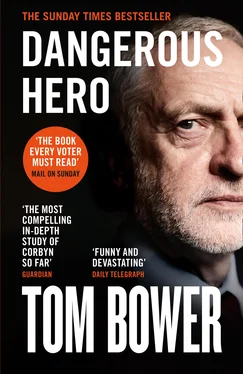In 1970, three years after leaving Britain, Corbyn returned to his family’s Shropshire home. He had not once spoken with his parents during his time away. On the single occasion he telephoned his home, there was no reply.
He returned to a seemingly empty future. Not only did he have no prospects, but he had missed the best of the swinging sixties. Although he would later claim to have joined his brother Piers on an anti-Vietnam war demonstration in London, that famous clash between the children of the counter-culture and the police had erupted during his absence, back in 1968. He also missed the big anti-apartheid marches of the 1960s, only joining their mini-successors two decades later, such as the Trotskyist ‘Non-Stop Picket’ breakaway group championing illegal protests in London, during which he was arrested. In speeches or interviews he never mentioned the outbreak of urban terrorism – Baader Meinhof in Germany, the Red Brigade in Italy, the Red Army in Japan, the Weathermen in America, the Quebec separatists in Canada, the Angry Brigade in Britain. Unlike every other leftist, he did not march with CND from Aldermaston to London every Easter. The politics of the sixties philosophers who had so influenced young undergraduates had no relevance to someone filled with Walter Rodney’s protests against colonial oppression. Perhaps a particular loss, he had missed the election in November 1970 of Salvador Allende, Chile’s Marxist president. His only contemporaneous eyewitness experience was the resurgence of the IRA’s war against colonialism.
On his return to Britain, now twenty years old, he had good reason to be apprehensive. Minimally educated, unqualified and unable to engage in hard work, he was isolated in Shropshire, forced to take a series of local jobs. In May 1972, after rejoining the Wrekin Labour Party, he arrived at the Young Socialists’ annual congress in Skegness with Andrea Davies, a nurse from Telford, his first British girlfriend. Although ostensibly a Labour Party function, the camp for five hundred members was run by Liverpool’s Militant Tendency, a group of revolutionary socialists formed in Liverpool in 1955 with the express purpose after the mid-1960s of infiltrating Labour to make the theories of Trotsky, Marx, Lenin and Engels official party policy.
Among those Corbyn met at the camp were Keith and Val Veness, two activists from Islington, then a rundown area of north London. Keith, a salt-of-the-earth, self-educated employee of NUPE (a trade union for public sector workers), was on the verge of joining the Workers Revolutionary Party, another group of Trotskyites, more intellectual but less well organised than Militant. ‘I was on the right wing of the delegates,’ he recalled. He regarded Clement Attlee’s post-war government as ‘social democrats, not the real Labour Party’.
Over the weekend, the four bonded. ‘I’m from Telford New Town,’ said Corbyn, suggesting that he lived in a working-class area. Keith Veness found his new companion’s intense commitment instantly charismatic. He told him that Labour membership had been much reduced during Harold Wilson’s government. ‘We’re an empty shell in London,’ he said, explaining that Labour’s branches were open to far leftists like himself. He urged Corbyn to join the cause, and as an introduction ‘to read the classics – Marx, Trotsky and other philosophers’. Corbyn nodded enthusiastically. To get him started, Veness handed him a copy of Trotsky’s History of the Russian Revolution , which he had just won at the camp’s raffle. Six months later Corbyn returned the book, still in its wrapping. ‘He wasn’t interested in reading anything,’ Veness concluded. ‘Not even Lenin on imperialism. It was a waste of time talking to him about books.’ Veness could not decide whether Corbyn was unintellectual or just lazy. There was no disagreement about politics, however. Over that weekend Corbyn immersed himself in a group dedicated to highlighting class conflict. By raising people’s consciousness about the horrors of capitalism, his instructors explained, the masses would be mobilised for revolution. To achieve equality and justice, capitalist wealth would be confiscated and aggressively redistributed to the poor.
Corbyn and the Venesses came together at a decisive moment in British politics. The Tories under Ted Heath were in turmoil. The unexpected defeat of Harold Wilson’s Labour government in the 1970 election and the Conservatives’ victory had followed a decade of industrial strife. Trade union shop stewards continually called for strikes. Repeated walkouts by seamen, dockers, railway workers and employees of all the country’s major industries – shipbuilding, car manufacturing and engineering – had crippled the economy. Continental Europe was thriving while Britain tottered on amid shortages of food and fuel. Exports drained away, and foreign competitors grabbed Britain’s traditional markets. After devaluing the pound in 1967, the Labour government was accused of creating ‘the British disease’ – a growing trade deficit, low productivity, high unemployment, a ballooning national debt, an exodus of talented professionals and, above all, industrial anarchy. Under Wilson, eleven million working days were lost to strikes in 1970 (compared to 900,000 in 2017). Once Wilson abandoned his attempts to control trade union militancy, the electorate had turned to Heath to prevent left-wing union leaders from destroying the country.
Heath, however, fudged his party’s manifesto pledge to unravel the socialist economy imposed by Labour governments since 1945. Airlines, the telephone network, road haulage, the steel industry, utilities, coalmines and the railways were all state-owned. Whitehall’s civil servants not only managed the economy but also, through joint committees with trade unionists and employers, industrial production, the regulation of incomes and prices in shops. Privatisation would eventually show that the public-owned industries were largely run for the benefit of their employees. Nationalised industries were 40 per cent overmanned, and costs were inflated by about 20 per cent; but after two years in government Heath lacked the conviction and the courage to destroy the consensus accepted by both Tories and Labour since the war. Besieged by strikes, Heath faced in particular Arthur Scargill, a Marxist miners’ trade union leader who had called out his members to strike for a 40 per cent pay rise. ‘We took the view we were in a class war,’ said Scargill. ‘We were out to defeat Heath.’ Thousands of miners confronted and outnumbered police. ‘This conflict,’ wrote Heath, ‘was the most vivid, direct and terrifying challenge to the rule of law that I could ever remember.’ Knowing that the miners held the country to ransom because its electricity supplies depended on coal, Heath panicked. In his search for a way to escape, he appointed Lord Wilberforce, a senior judge, to review the miners’ pay. Wilberforce decided in just three days that the 16.5 per cent pay rise they had been offered was insufficient, and that they should receive 20 per cent. Heath instantly capitulated, despite knowing full well that every other union would demand similar pay rises. In 1972, twenty-three million working days were lost to strikes.
Corbyn and his new friends rejoiced in Heath’s surrender. It was a tumultuous moment in the Labour Party. Britain’s trade union leaders, some of them on Russia’s payroll, were sabotaging the economy in order to topple the government. The outrage among the Tories only increased the pleasure among the Young Socialists gathered at Skegness.
The infiltration of Labour had been advocated by Lenin. ‘Support the Labour Party as the rope supports the hanged man,’ he had told Sylvia Pankhurst, who had hosted the first meeting of the British Communist Party. Lenin taught that the far left should gain political power in Britain by taking control of the Labour Party. Once the communists commanded the party, and then became elected to government, they could destroy capitalism. Thus battle was joined. In the early days, democratic socialists expelled communists and Trotskyites from Labour, but during the 1960s Harold Wilson inexplicably relaxed the controls, and ‘entryists’, as they were known, were allowed to join the party. Constituency parties were infiltrated by Trotskyites, who then deselected any social democrats. Effectively, a separate hostile party was flourishing within Labour, and more and more communists were elected as Labour MPs. Their object was to use the democratic machinery of Labour to undermine democracy. The result was toxic. In February 1973, in the wake of Heath’s surrender to the miners, Wilson succumbed to left-wing pressure to sign a ‘compact’ for the party’s next election manifesto. To win workers’ support, Labour pledged to extend nationalisation, prevent Britons taking money abroad, impose a rent freeze, enforce price controls on private business, finance widespread food subsidies, and push through a ‘large-scale redistribution of Britain’s income and wealth’ – precisely the programme that Corbyn and the Venesses saw as the first step towards their Marxist ideal.
Читать дальше










